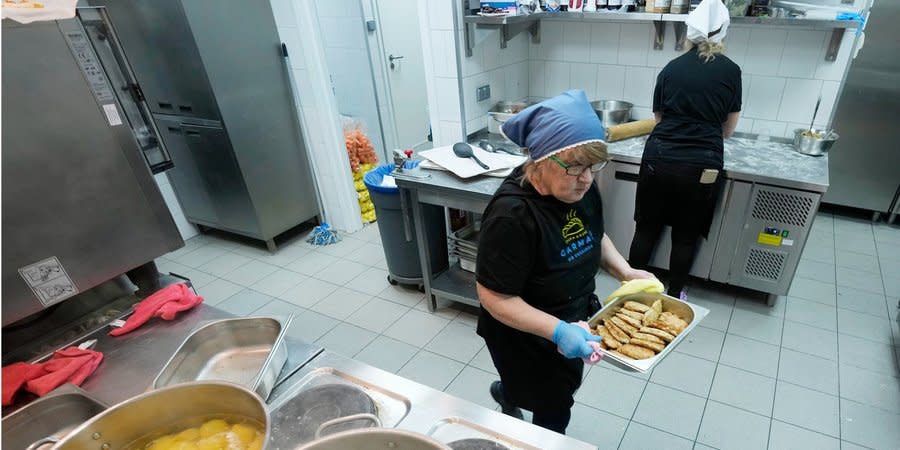Assessing vital skills for Polish job market – NV analysis

Around 60-70% of Ukrainians who sought refuge in Poland following Russia’s full-scale invasion of Ukraine are choosing to pursue low-skilled professions, an analysis by NV has revealed.
Amidst a burgeoning national economy, the Polish job market is facing a pressing demand for diverse professionals, including in the construction sector, medical fields (ranging from nurses to psychotherapists), as well as electricians, locksmiths, carpenters, welders, chefs, bakers, transportation and logistics personnel, and even accountants.
Read also: IT companies show increasing activity in job market, despite crisis
The insights were revealed by an analysis of the Occupational Barometer 2022 study.
This information is detailed in the article titled “Conveyor belt from the East: How Ukrainians have become the driver of Poland’s economy,” featured in Issue No. 3 of NV Magazine.
Presently, the majority of Ukrainian citizens residing in Poland are women with children, who often find employment below their level of qualifications. This data originates from a study conducted by the EWL Migration Platform and the Center for East European Studies at the University of Warsaw.
Read also: Top 5 Polish cities in need of Ukrainian workers and proposed salaries
A significant trend within the Polish job market is the notable shortage of male workers, with the most challenging vacancies to fill being those necessitating specialized qualifications such as welding, carpentry, and electrical expertise. Anna Dzhobolda, Director of the Recruitment Department at Gremi Personal, shared this observation.
From the perspective of Polish employers, approximately 5,000 job openings are available to Ukrainians on average each month, with the highest numbers concentrated in Warsaw, Krakow, and Wroclaw, said Victoria Novosad, an analyst at jobs website Jooble.
Novosad further said that during the winter months, there are more vacancies for Ukrainians in Poland in areas such as retail, sales, and related warehouse administrative roles. Conversely, the summer months see a surge in job openings in the production and construction sectors, in roles such as mechanics, electricians, builders, and welders.
“Popular positions for Ukrainians in Poland as of July include seasonal work in the restaurant and hotel industry,” Novosad added.
Opportunities for drivers encompassing various categories and delivery roles are also abundant. However, the demand for ‘white-collar’ positions like Java Developers or Project Managers arises less frequently, Novosad said.
Read also: Survey reveals what would persuade Ukrainian refugees in Poland to return home
Moreover, Ukrainians are progressively venturing into higher-skilled roles spanning IT, sales, HR, management, personnel administration, and finance. This transformation is attributed not solely to the growing assimilation of compatriots in Poland but also to the prevalence of Ukrainian-owned businesses in the local market. These businesses often hire fellow Ukrainians for a range of responsibilities, as highlighted by job agency Gremi Personal.
Gremi Personal identifies the top three sought-after positions as cooks, berry and vegetable/fruit pickers, and kitchen assistants. Also featuring in the top ten are courier-drivers, dishwashers, waiters, baker assistants, general laborers, housekeepers, and caregivers for the elderly.
“These are the roles most frequently chosen by our clients when seeking employment,” said Gremi Personal’s Dzhobolda. She also noted that the majority of these positions are concentrated in the food industry and logistics sectors, including packaging.
Read also: Europe struggling to plug workforce gaps with Ukrainian refugees, media reports
Dzhobolda noted that roughly 60-70% of those arriving in Poland after the full-scale invasion enter the workforce without a strong command of Polish, leading them to often opt for low-skilled professions. However, another trend is also emerging. While prior to the conflict, the majority of Ukrainian labor migrants did not actively pursue language learning, nearly 80% of current compatriots are now learning Polish. This shift is attributed to the desire for integration and future prospects of securing more qualified roles.
This article was originally published in the August 2023 Issue No. 3 of NV Magazine.
We’re bringing the voice of Ukraine to the world. Support us with a one-time donation, or become a Patron!
Read the original article on The New Voice of Ukraine

